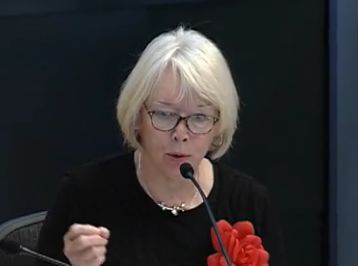Bagshaw, Burgess, and O'Brien Zoom In on Core Debate Over Encampment Legislation

1. The city council’s human services committee met yesterday morning to vet ACLU legislation about homeless sweeps (the proposal was co-drafted by the ACLU and homeless advocates at Columbia Legal Services and the Seattle King County Coalition on Homelessness.)
The proposal, seeking to stop homeless encampment sweeps, makes it more difficult for the city to remove people experiencing homelessness from unauthorized encampments; a recent federal court ruling in Tacoma seemed to bolster the ACLU/CLS/SKCCH position that sweeps violate people’s civil rights.
The proposal says that if campers are living on what’s deemed an unauthorized yet temporarily “suitable site”—one that’s not unsafe, hazardous, or unsuitable—the city has to provide housing before sweeps and provide 30-day notice before removing people; unsafe, hazardous, or unsuitable sites are, for example, spots that are near major arterials, sites where human waste and garbage and needles have accumulated, or spots, like a park play field, that are designated for other public uses.
In the case of removing people from those verboten spots, the city has to provide 48-hour notice and provide a suitable alternative spot—including another technically unauthorized spot.
Current protocols are less permissive. The city only has to provide 72 hours notice for all sites and simply provide social service outreach, which, according to ACLU ally, council member Lisa Herbold (and the Seattle Times, for that matter) is “very spotty.”
The crux of the debate over the proposal was captured during an exchange between council member Mike O’Brien, theee definition of a privileged progressive ally when it comes to today’s social justice culture wars and council member Tim Burgess, often viewed as a curmudgeon by progressives, but in reality, a thoughtful liberal.
Burgess said “One of my core concerns about this ordinance is that if we follow this approach, we will be voting to allow permanent camping on public property that the city defines as ‘suitable.’ It suggests that our response to homelessness is to allow camping in the city…something that other cities have tried and experimented with [he cited Portland] and are running away from as fast as possible because of the problems that creates.”
O’Brien—asked by committee chair Sally Bagshaw to give “a rebuttal,” pretty much allowed that Burgess was right, but that in his own estimation, that wasn’t necessarily a bad thing at the moment. “Until we have sufficient housing for folks, I’m not prepared to say you can’t stay outside in our city.”
O’Brien noted that Portland’s mayor had allowed people to camp on sidewalks anywhere in the city, which was different than the ACLU idea, and added: “My intent is not to say that there’s an unlimited ability for people to camp freely. There is a trigger that we have to provide housing for folks, and when we have that housing then we have the ability to remove folks even from suitable locations. I think we agree that to have enough suitable housing is probably a little ways away.”

Bagshaw seemed to resolve the debate by siding with O’Brien. She seconded O’Brien’s assessment that the city can’t just nudge campers around from place to place.
“My goal here, is not to say camping is the preferred alternative,” she said, noting the recent mayor’s report calling for providing housing first. “But we don’t have that right now. We have to be honest about that. We don’t have places for everyone to be. As we’re building toward that we need to have a humane response, make place for people to be where they’re safe.” She said she was looking at the new encampment protocols as a temporary alternative—18 months to two years—to give the mayor time to put the housing first solution in place.
Of course, this is Sally Bagshaw: She simultaneously seconded Burgess’s point by also saying: “We also have to acknowledge that neighborhoods and businesses have rights to. Both those things are true.”
2. File this under Morning Jolt—the winner being Sound Transit.
The state Public Disclosure Commission ruled against an ethics complaint that ST3 detractors filed against the agency earlier this year when Sound Transit accidentally provided the pro-ST3 campaign with email addresses of potential supporters.
In response to the PDC's exoneration of any wrongdoing, Sound Transit said this morning:
Following a complaint from a political consultant, the PDC staff's investigation as well as an investigation by an independent attorney hired by Sound Transit made clear that the staff who processed the public records request did not know that they were releasing email addresses that were exempt from disclosure requirements.
While the public records request was associated with advocacy for transit, it was not treated in any manner different than any other public records request. State law explicitly requires that an agency cannot consider the identity of the person making the public records request or the purpose for the request, but rather must treat all requestors the same.




